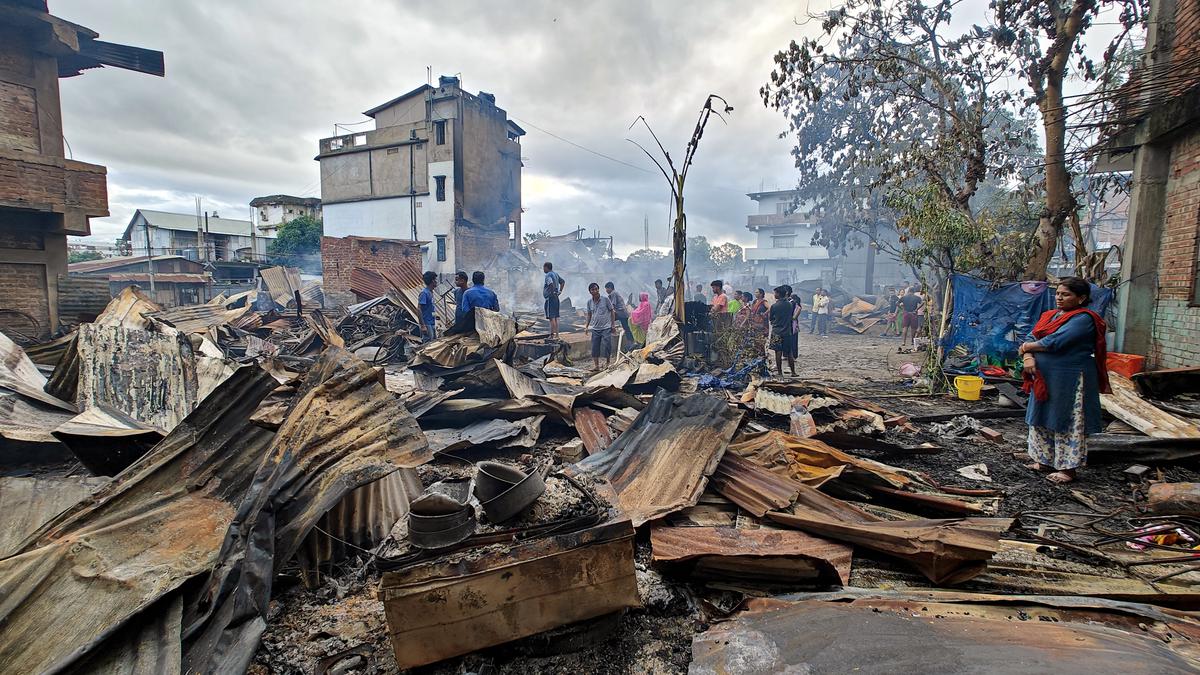
On delisting some Kuki-Zomi tribes in Manipur | Explained
The Hindu
The Manipur Government is examining a representation to delist certain Kuki and Zomi tribes from the Scheduled Tribes list, potentially widening existing divides among communities in the State.
The story so far: The Manipur Government has been asked by the Centre to examine a representation seeking the delisting of certain Kuki and Zomi tribes from the Scheduled Tribes (ST) list of Manipur. Following this, Chief Minister N. Biren Singh announced in Imphal that a special committee might be formed to look into it. The representation was sent by Maheshwar Thounaojam, National Secretary of the Republican Party of India (Athawale) in Manipur, who argued for the inclusion of Meiteis in the ST list by seeking the exclusion of certain Kuki and Zomi tribes.
This attempt to initiate a process for the possible de-scheduling of certain Kuki and Zomi tribes comes as the State runs into the eighth month of the ethnic conflict between the valley-based Meitei people and the hills-based Kuki-Zo (ST) people. The conflict, that began on May 3, 2023, is said to have been triggered by an order of the Manipur High Court, which directed the State government to send a recommendation on the Meiteis’ inclusion in the ST list to the Centre.
Now that a similar request has been forwarded by the Centre to the State government, this time over a representation to delist Kuki and Zomi tribes, there is potential for the widening of existing divides among the communities in the State. Among the key reasons for which Meiteis have argued for ST status has been their inability to own land in the forested hill districts, where only STs can own land. This is the first time members of the Meitei community have tried to argue for their inclusion on the ST list by arguing that certain Kuki and Zomi tribes did not deserve to be on it. This move could also have implications on the criteria used to define groups as STs; unchanged since the Lokur Commission introduced them in 1965.
In Mr. Thounaojam’s representation, objections have been raised against the inclusion of three specific entries in the ST list of Manipur — “Any Mizo(Lushai) Tribes”, “Zou”, and “Any Kuki Tribes” over time. The principal argument being made for the exclusion of these three entries has been that they are not “indigenous” to the land of Manipur. The representation claimed that there had been no mention of these particular tribes residing in the land of Manipur in pre-Independence Censuses. It also said that the ambiguity of “Any Mizo (Lushai) Tribes” and “Any Kuki Tribes” in the ST list has allegedly aided illegal immigrants from Myanmar and Bangladesh in obtaining benefits meant for STs in India.
The argument that these communities were not residing in the land of Manipur at the time the first Constitution (Scheduled Tribes) list was published in 1950 does not hold ground. To begin with, this order had listed three tribes for Manipur — “Any Kuki Tribe”, “Any Lushai Tribe” and “Any Naga Tribe”, under which respective sub-tribes were to be subsumed. Secondly, there is no empirical evidence, as of yet, to show that these tribes names’ presence in the ST list has aided any form of organised illegal immigration into Manipur, beyond individual instances and the rhetoric presented by the Meitei community.
However, the First Backward Classes Commission had noted in its 1955 report that these three broad tribe classifications originated under the British administration, adding that several communities such as Paite and Hmars refused to be identified under the umbrella of Kukis. Accordingly, the Commission had recommended that for tribes of Assam and the hills of Manipur, individual tribe names be added to the ST list instead of umbrella tribes, for which these lists must be redrawn entirely given the dated nature of the information. Subsequently, when the ST list for Manipur was revised in 1956, it included 29 entries with individual tribe names, save for one —“Any Mizo (Lushai) Tribe” — which was retained. This list also included the tribe “Zou”. But Mr. Thounaojam’s representation has claimed that neither of these entries were specifically recommended by the First Backward Classes Commission.
Again in 1965, when the Lokur Commission prepared its report, it had also noted that there has been a “splintering tendency” among Kuki tribes. “Sub-groups and even clans wish to establish themselves as distinct entities in the political and social structure,” the Commission had said of the Kuki tribes. This “splintering tendency” among the Kuki tribes grew over the years, according to representatives of Kuki-Zo communities in Manipur, which eventually led several communities to adopt their unique community’s identity. By the end of the century, most people who would be considered under the umbrella of Kukis had already established their independent tribe names that had been added to the ST list over the years. Yet, there remained a need to address the need of a minority number of people who wanted to identify as Kukis, a Zomi representative explained. As a result, in 2002-2003, the entry “Any Kuki Tribes” was added to the ST list of Manipur.





















 Run 3 Space | Play Space Running Game
Run 3 Space | Play Space Running Game Traffic Jam 3D | Online Racing Game
Traffic Jam 3D | Online Racing Game Duck Hunt | Play Old Classic Game
Duck Hunt | Play Old Classic Game











